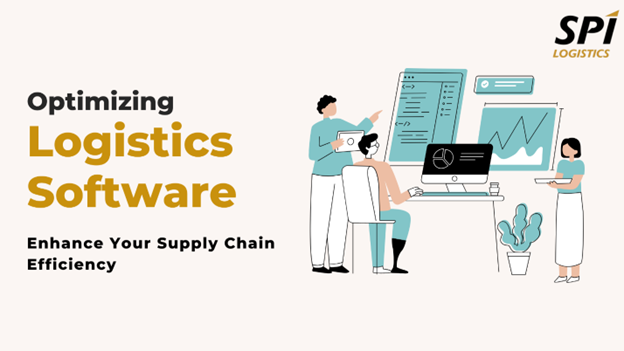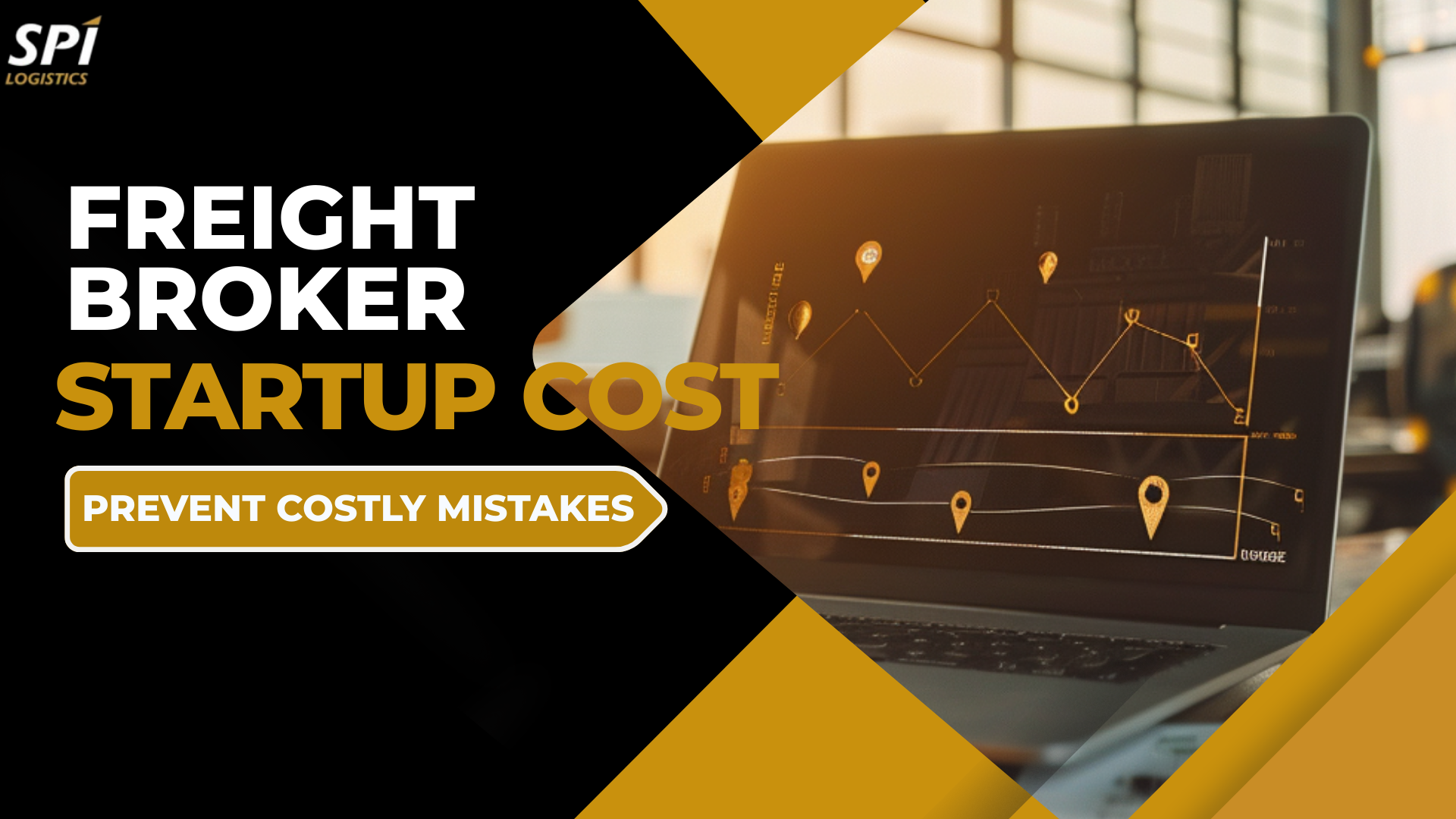You are not alone if you find yourself constantly juggling your logistics operations. With shifting market demands, increased customer expectations, and a need for real-time tracking, businesses have to leverage advanced logistics tools to stay competitive. With numerous logistics management solutions, the right technology is crucial to compete. In this article, we’ll explore logistics software, its key features, different types available, the top 10 logistics software solutions, and the benefits of implementation.
What is Logistics Software?
Logistics software is designed to automate the planning, execution, and tracking of shipments, warehouse operations, and inventory control. By utilizing logistics management software, companies can automate workflows, reduce human errors, and gain real-time visibility into their logistics processes. A well-integrated logistics management system helps businesses optimize routes, track shipments, and manage resources effectively.
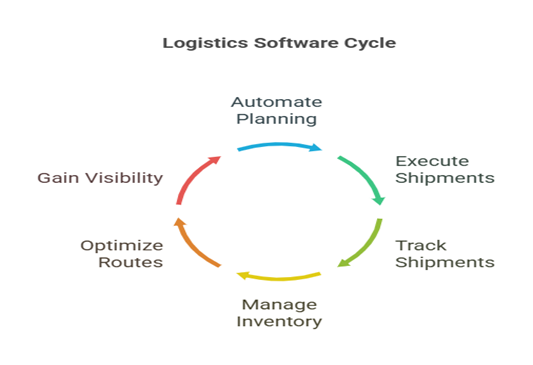
“Implementing logistics software is no longer optional—it’s a necessity. Companies that fail to adapt will struggle with inefficiencies and higher operational costs.”
Key Features of Logistics Management System Software
Choosing the proper logistics software solutions requires understanding the essential features that can improve your business operations. Some of the most critical capabilities include:
- Real-time tracking and visibility – Logistics tracking software ensures shipments are monitored from dispatch to delivery.
- Automation and optimization – Transportation logistics software minimizes delays and reduces costs through automated scheduling.
- Scalability and integration – The best logistics tools can seamlessly integrate with other business management software.
- Data analytics and reporting – Advanced logistics software programs provide insights for better decision-making.
- User-friendly interface – A simple and intuitive design makes implementation smoother.
“AI-driven logistics platforms are transforming supply chains by providing predictive analytics and reducing inefficiencies by up to 35%.”
How can AI-driven logistics software improve supply chain efficiency, and what are the implementation challenges?
Types of Logistics Software
There are various logistics software solutions tailored to different business needs. Some common types include:
- Transportation Logistics Software: Helps optimize shipping routes and fleet management.
Example: A DHL case study showed that integrating transportation logistics software reduced delivery times by 22% and fuel costs by 15% (DHL, n.d.).
- Logistics Scheduling Software: Assists in planning and automating delivery schedules.
Example: Amazon’s use of AI-powered scheduling software increased its last-mile delivery efficiency by 35%
- Shipping Logistics Software: Manages order fulfillment and carrier selection.
Example: FedEx’s intelligent shipping software reduced errors in delivery addresses by 40% (FedEx, n.d.).
- Warehouse Management Systems (WMS): Streamlines inventory and storage operations.
Example: Walmart implemented a WMS that cut inventory holding costs by 30%
- Freight Management Software: Ensures efficient coordination between freight shippers and carriers.
Example: A freight broker using FreightPOP reported a 25% increase in shipment volume without additional staff (FreightPOP, n.d.).
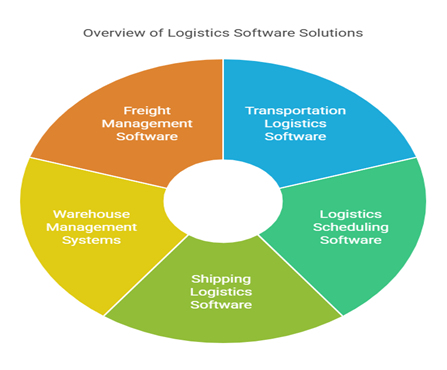
“Freight management software is a game-changer for businesses looking to reduce transit times and increase delivery accuracy”
Looking for the right logistics technology? Explore our freight broker technology to streamline your operations.
The Top 10 Logistics Software Solutions
With a wide variety of logistics software companies offering innovative tools and platforms, selecting the right solution can be challenging. To simplify this decision-making process, here are the top 10 logistics software solutions that leading logistics software companies provide:
-
SAP Logistics Business Network – A cloud-based solution that enables real-time communication and data sharing across the supply chain, helping businesses reduce delays and improve decision-making.
SAP’s platform also integrates with other enterprise systems, making it a versatile choice for large-scale operations. -
Oracle Transportation Management – An enterprise-level transportation logistics software that optimizes routing, fleet management, and shipment tracking. It offers advanced analytics and reporting tools to help businesses minimize transportation costs and improve delivery performance.
Oracle’s solution is particularly beneficial for companies managing complex, global supply chains. -
Blue Yonder (JDA Software) – Uses AI and machine learning to automate supply chain planning and logistics execution. Its predictive analytics capabilities allow businesses to anticipate demand fluctuations and adjust operations accordingly.
Blue Yonder’s platform is ideal for companies looking to leverage cutting-edge technology to stay competitive in dynamic markets. -
Manhattan Associates Supply Chain Software – A comprehensive solution for warehouse, transportation, and distribution management. It provides end-to-end visibility into supply chain operations, enabling businesses to optimize inventory levels and reduce operational inefficiencies.
Manhattan Associates is known for its robust scalability, making it suitable for both mid-sized and large enterprises. -
Descartes Logistics Solutions – Focuses on real-time shipment visibility, compliance management, and route optimization. Its global trade intelligence tools help businesses navigate complex regulatory requirements, ensuring smooth cross-border operations.
Descartes is particularly valuable for companies with international logistics needs. -
MercuryGate TMS – A scalable logistics management system software tailored for freight brokerage, 3PLs, and enterprise shippers. It offers advanced features like carrier selection, freight audit, and payment processing, all within a single platform.
MercuryGate’s flexibility makes it a popular choice for businesses of all sizes. -
Kuebix TMS – A flexible and easy-to-use logistics software for freight management, offering both free and premium features. It simplifies load planning, carrier selection, and shipment tracking, making it accessible for small to medium-sized businesses.
Kuebix also integrates with other supply chain tools, providing a seamless user experience. -
Shipwell Logistics Platform – A modern cloud-based logistics platform with integrated tracking and shipment automation. It offers real-time visibility into shipments and automates repetitive tasks, saving time and reducing errors.
Shipwell’s intuitive interface and robust API make it a favorite among tech-savvy logistics teams. -
Logility Supply Chain Optimization – Provides demand planning, inventory optimization, and transportation management tools. Its advanced algorithms help businesses forecast demand accurately and maintain optimal inventory levels, reducing waste and improving profitability.
Logility is particularly effective for companies in retail and manufacturing. -
FreightPOP Transportation Management – A user-friendly logistics scheduling software that simplifies the entire freight management process, from quoting to invoicing, making it ideal for businesses looking to improve operational efficiency.
FreightPOP’s mobile-friendly design ensures accessibility on the go.
These logistics management system software solutions provide businesses with real-time tracking, automation, and seamless integration, making them invaluable for optimizing logistics operations.
“The key to success lies not just in adopting technology, but in choosing a solution that aligns with your specific business needs and scales with your growth.”
Which logistics software is best suited for small and medium-sized businesses, and how does scalability impact their decision?
Benefits of Implementing Shipping Logistics Software
Adopting a reliable logistics management system software offers multiple advantages:
- Enhanced Efficiency: Automates key logistics functions, reducing manual efforts.
Example: A 3PL company using Shipwell improved order processing speed by 40% (Shipwell, n.d.).
- Cost Reduction: Lowers operational expenses by optimizing resources.
Example: Companies using AI-based logistics reduced transportation costs by 18% on average (McKinsey, 2023).
- Improved Customer Satisfaction: Faster and more accurate deliveries improve customer experience.
Example: UPS’s smart route optimization improved on-time delivery rates to 98.7% (UPS, n.d.).
- Scalability: Adapts to business growth and changing logistics demands.
Example: SMEs implementing scalable logistics software reported a 50% reduction in supply chain disruptions (Gartner, 2024).
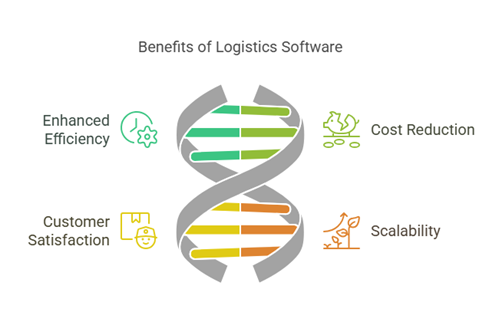
“A well-implemented logistics software solution can lead to improvement in supply chain visibility, ultimately driving higher customer satisfaction and lower costs.”
Are you ready to optimize your freight brokerage operations? Discover innovative freight broker solutions that can enhance efficiency and profitability
Frequently Asked Questions (FAQs)
1. What is the best logistics management software for small businesses?
The best logistics management software for small businesses depends on their needs, but options like Kuebix TMS and Shipwell are user-friendly and cost-effective.
2. How does transportation logistics software improve supply chain efficiency?
Transportation logistics software optimizes routing, automates scheduling, and provides real-time tracking, reducing delays and improving overall supply chain efficiency.
3. What are the key differences between logistics tracking software and logistics scheduling software?
Logistics tracking software focuses on real-time shipment visibility, while logistics scheduling software helps automate and manage delivery planning and scheduling.
4. Are logistics software programs customizable for different industries?
Yes, many logistics software programs offer customizable features tailored to industries like retail, manufacturing, and e-commerce.
5. What should I consider when selecting logistics software solutions?
When choosing logistics software solutions, consider factors like integration capabilities, scalability, automation features, and real-time tracking options.
6. How do logistics software companies ensure data security?
Leading logistics software companies implement robust cybersecurity measures, including encryption, multi-factor authentication, and compliance with industry standards.
Transform Your Supply Chain with the Best Logistics Software
Choosing the right logistics management solutions can significantly impact business efficiency and profitability. With the right logistics software, companies can enhance their supply chain operations, reduce costs, and stay ahead in the competitive market.
Ready to start exploring the best logistics management software? Contact us to transform your logistics operations.
References
DHL. (n.d.). Optimizing logistics with technology. Retrieved from https://www.dhl.com
FedEx. (n.d.). Smart shipping solutions. Retrieved from https://www.fedex.com
FreightPOP. (n.d.). Freight management efficiency. Retrieved from https://www.freightpop.com
Gartner. (2024). Supply chain technology trends. Retrieved from https://www.gartner.com
McKinsey. (2023). AI in logistics. Retrieved from https://www.mckinsey.com

